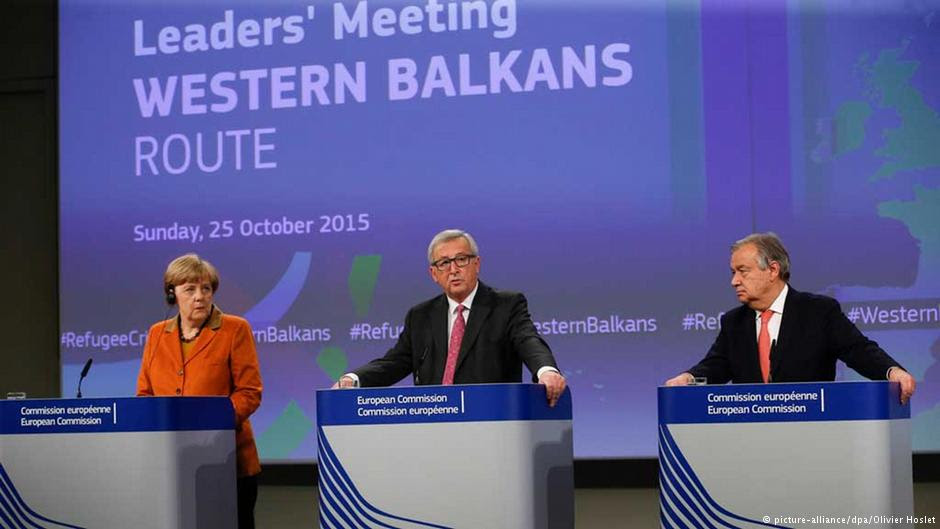
European Commission mini-summit
on refugee crisis
Sunday 25 October 2015
Following on to my last post the EC crisis mini-summit held in Brussels Sunday 25 October 2015 appears as yet another proof that EU leaders are still out with the Fairies when it comes to solving this crisis. Given that Germany's Angela Merkel was very very loud in her invitations for all to come to Germany, and other Western European countries such as Sweden spread out their Welcome mats, it's only natural that courage and the concept of entitlement are now instilled in all who are coming to Europe regardless of whether they are genuine refugees or illegal economic migrants. How can those countries who wield power in EU now ask the countries where these wretched people pass to "put the brakes on?" It is utterly irresponsible for in a mindset such as the one of welcome created, no "brake" is possible without some force. Such a situation of "needing to put the brakes on and being asked to do so for people who obviously need help" only leads in more instances than not, it seems, to humiliation, fear and going hungry as there is little food to go around.
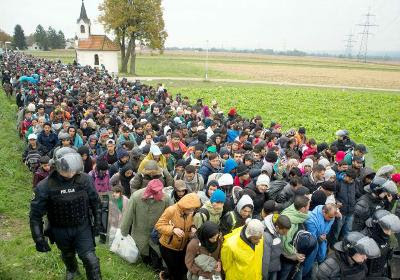
October 2015
Refugees and migrants
making their way across Croatia
to Slovenia
European Commission from its Sunday 25 October 2015 mini-summit wants: humane conditions for the refugees, for countries affected by the massive refugee transit (such as Croatia, Slovenia...) it wants better communication among the countries and, to top the "fairy gilding" on its Magic Wand it wants an end to the "disorderly" influx of refugees and illegal economic migrants. The leaders reportedly agreed to implement a 17 point operational measures as of Monday 26 October 2015 (Click here to see PDF version of statement on 17 points ). I refer to the Fairies here because it seems to me that those 17 points are more like a declaration of intent than an Action Plan to which all relevant parties are subscribed and for which conducive conditions exist.
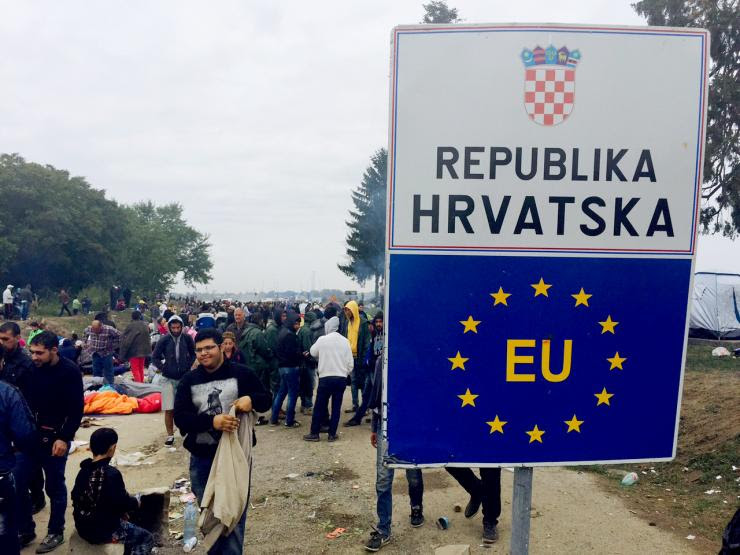
At the Republic of Croatia border with Serbia
Photo: Branko Filipovic/Reuters
Talking of some concrete, hard figures, the 17 point plan does include 400 police officers to help out in Slovenia (where Schengen border is), the EU border security agency Frontex is to provide assistance in Greece (where Schengen border is) and on the Serbia-Croatia border (where EU border is). The European Union also pledged to help set up 100,000 places in reception centres along the route through the Balkans (50,000 in Greece and 50,000 - it does not specify. Within Croatia there are real fears of "hot-spots"/reception centres/camps being set up that would throw the country into disarray and anger at being duped or bamboozled into carrying the impossible load of dealing with refugees and illegal migrants without proper or adequate condition by its current government and the EU. Hundreds of thousands of refugees have already passed through Croatia since mid-September - the number now revolving around 275,000 and the flow-through to the countries of desired destination (Germany, Sweden, UK...) is fast becoming clogged up with saturation of numbers the Western European countries can receive.
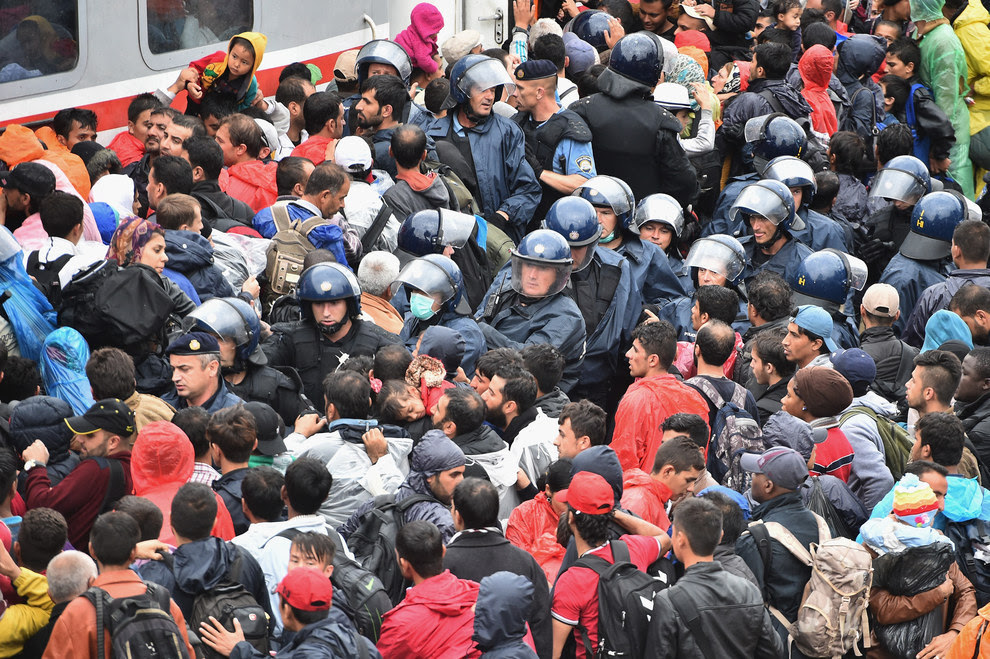
Croatia - Tovarnik
Refugees pushing to get
on train to Slovenia
October 2015
Photo: AP
Whether Germany or any other Western Europe country has reached saturation point, has reached or is about to reach the limit of how many refugees or migrants they can receive is not important or critical in this at all and "directives" to slow the influx are quite misguided and serve mainly the purpose of stalling a humanitarian calamity there that does not relate only to refugees/migrants but also to the domestic population whose opportunities in "sharing the livelihood cake" become increasingly depleted. With such large numbers of people on the move it's not likely most will sit still in reception centres for years - they are likely to run and risk getting caught; most are at the stage where getting caught may appear a better prospect to many than staying still...EU (or indeed EU member countries affected) must prepare to deal with this and whether some force will need to be employed when/if saturation with refugees and illegal migrants starts threatening the livelihood of their own citizens due to lack of resources.
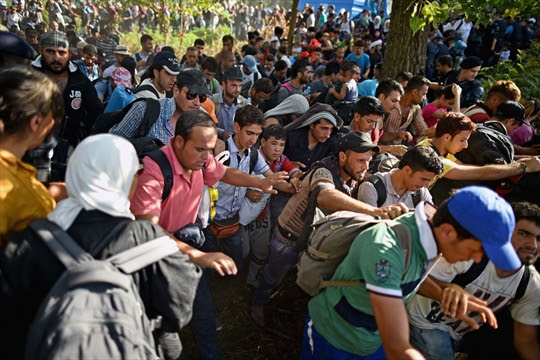
Refugees in Croatia
Stampede is on to move on
Demands to shut down the borders are on the rise. Bulgaria's prime minister is toying with the idea - “If Germany, Austria, and other countries close their borders, we will not let our nations become a buffer zone; we will have the readiness to close ours in the same manner,” said Bulgarian Prime Minister Boyko Borisov on Saturday 24 October, the Slovenian government says fences are an option and Croatia's president would like to send the army to guard the border with Serbia. Hungary's fence was deemed un-European in September 2015, but now, the idea of fences is becoming mainstream. The fear of being overrun by refugees and illegal migrants from the Middle East has won government for the Polish conservative and Europsceptic Law and Justice Party two days ago. "Croatia can be satisfied with the results of the talks in Brussels, which were attended by Western Balkan countries on the refugee route", Croatian interior minister Ranko Ostojic said Monday 26 October. He added that Frontex observers will supervise situation at the railway station in Sid (Serbia), where the refugees will board the trains and then be transported to a temporary winter camp in Slavonski Brod in Croatia.

Building at Slavonski Brod
Croatia to house refugees
Slavonski Brod centre can only house 5,000 and indications are that Croatia will be placed in a position - as Western European countries tighten the passageway for refugees and illegal migrants - to house more in accordance with the EC summit decisions from Sunday 25 October to set up 50,000 outside Greece in reception centres. So, the current Croatian government is actually setting-up a migrant "hot-spot" through "back doors"and it's telling the citizens it does not want and it will not permit Croatia to become one! The concept of "hot spot" in the context of the refugee/migrant crisis has grown to denote a place where largely unwanted as well as unwilling refugees and illegal migrants remain "by force" for a time and the way things are panning out such places are bound to become cesspits of social unrest and despair.

Site planned for refugee camp in Slavonski Brod Croatia
near the building that's being prepared
It's actually infuriating to hear the Croatian government minister (the government) say that Croatia can be satisfied with the Brussels 17 points! Croatia cannot and must not be satisfied with getting Frontex EU border security personnel to bamboozle it into carrying a hard refugee burden that should have been and should be shared between Schengen countries or countries that invited them in the first place. Frontex seems a toothless tiger just as UN peace keeping forces were during the 1990's war in Croatia backed by political interests of European elements who did not want the breakup of communist Yugoslavia. Croatia should rely on its own forces and Frontex can do the pencil-work of registering the refugees and illegal migrants if it wants. But, given that Croatia is currently ruled by those who didn't want its freedom from communist Yugoslavia perhaps the 8 November general elections will provide Croatia with a new door into a future designed to nurture the protection of Croatian life as a priority. Once a government protects its own in earnest then helping others comes in earnest as well - the ruling Social Democrats' political fiber, ex-communist league, has never and is never likely to look after Croats in earnest. The sooner the majority voters admit that the better for everyone. Ina Vukic, Prof. (Zgb); B.A., M.A.Ps. (Syd)
Nema komentara:
Objavi komentar